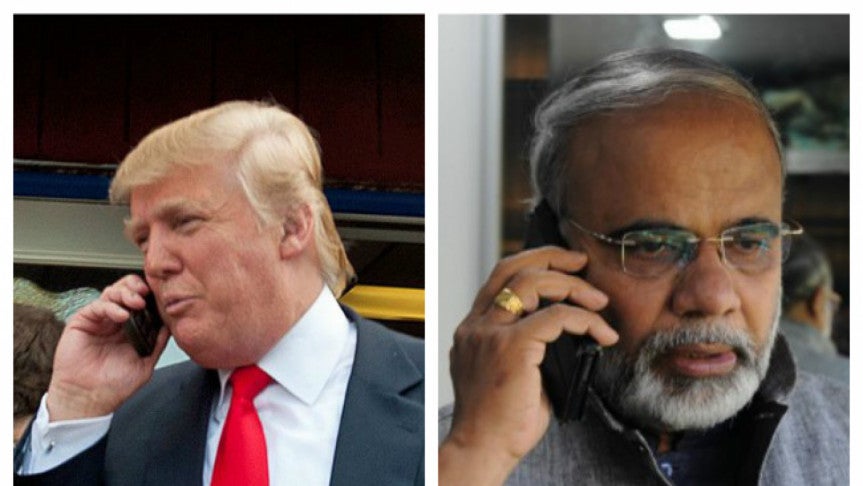Modi, Trump share 'warm' phone conversation

New Delhi, India: Indian Prime Minister Narendra Modi pledged on Wednesday to work closely with Donald Trump after the new US president invited him to Washington, looking to ensure an upturn in ties survives a change at the White House.
After their first phone call since Trump’s inauguration, the leaders of the world’s two largest democracies both indicated they had had a warm conversation and extended mutual invitations to their respective capitals.
Modi was effectively barred from the United States for many years as punishment for deadly communal riots in the western state of Gujarat during his time as chief minister.
But after his landslide election victory, Modi built a strong rapport with Barack Obama who became the first sitting US president to pay a second visit to India during the 2015 Republic Day celebrations.
A surprisingly warm conversation in November between Trump and Pakistan’s Prime Minister Nawaz Sharif caused alarm in New Delhi which is trying to portray its rival regime in Islamabad as the ‘mothership of terrorism’.
But official statements issued after Tuesday’s night phone call indicated that both men are keen to build on the recent improvement in ties.
Writing on Twitter, Modi said he ‘had a warm conversation’ with the new US president and that they had both ‘agreed to work closely in the coming days to further strengthen our bilateral ties’.
‘Have also invited President Trump to visit India,’ Modi added after the White House revealed Washington had extended a similar invite.
‘True friend’
During the call, Trump emphasised that the United States ‘considers India a true friend and partner in addressing challenges around the world,’ according to a White House readout of the call.
‘The two discussed opportunities to strengthen the partnership between the United States and India in broad areas such as the economy and defense.
‘President Trump looked forward to hosting Prime Minister Modi in the United States later this year.’
During his election campaign, Trump courted Indian-American voters and even released a campaign advertisement in Hindi for Diwali, the Hindu festival of lights—albeit in a thick US accent.
Several commentators have argued that Modi and Trump should have a natural affinity as two political outsiders who have risen to power in part by castigating the traditional ruling elite on a nationalist platform.
Trump’s chief strategist Steve Bannon described Modi’s victory in India’s 2014 general election as the first phase in a ‘global revolt’ against the existing order that culiminated with the outcome of November’s US polls.
The new president’s hardline rhetoric towards Muslims during his campaign found favour in some quarters in India, which has had its fair share of tensions between the majority Hindu population and its Muslim minority.
There are an estimated four million Indian Americans living in the United States according to 2015 census figures.
While Trump’s decision to pull the United States out of a trade pact known as Trans-Pacific Partnership (TTP) caused some consternation in other Asian countries such as China and Japan, India was not part of the agreement.
A report in Wednesday’s Hindustan Times said Trump’s reservations over an existing visa scheme allowing high-skilled foreign workers into the US could cause some friction but it quoted an Indian official as saying that ‘there is no other area of potential dispute’ with the new administration.

 AFP
AFP









